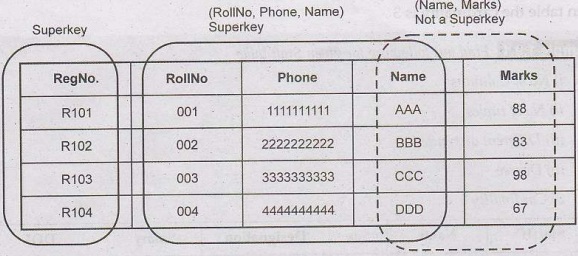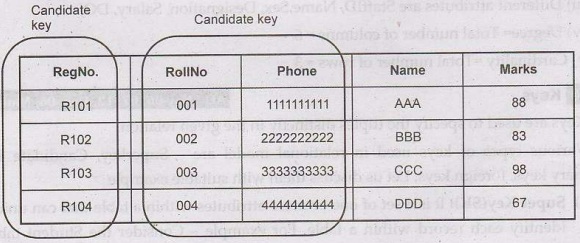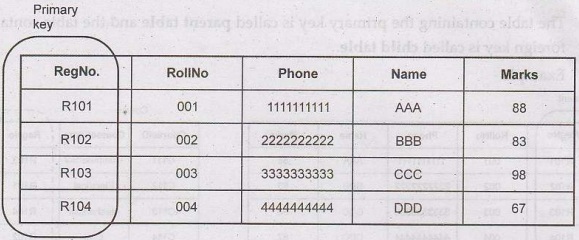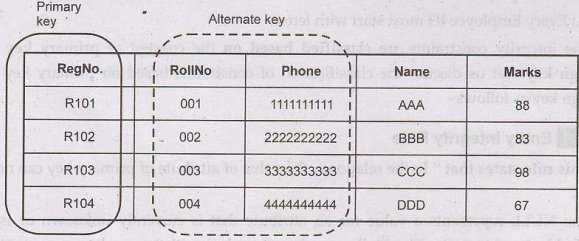Database Management System: Unit I: Relational Databases
Keys
Relational Databases - Database Management System
Keys are used to specify the tuples distinctly in the given relation. Various types of keys used in relational model are - Superkey, Candidate Keys, primary keys, foreign keys.
Keys
AU: May-06, 07, 12, Dec.-06, Marks 4
Keys are used to specify the tuples distinctly in the given relation.
Various types of keys used in relational model are - Superkey, Candidate
Keys, primary keys, foreign keys. Let us discuss them with suitable example
1) Super Key(SK): It is a
set of one or more attributes within a table that can uniquely identify each record
within a table. For example - Consider the Student table as follows-

The superkey can be represented as follows-

Clearly using the (RegNo) and (RollNo, Phone,Name) we can identify the
records uniquely but (Name, Marks) of two students can be same, hence this
combination not necessarily help in identifying the record uniquely.
2) Candidate Key(CK): The candidate key is a subset of superset. In other words candidate key
is a single attribute or least or minimal combination of attributes that
uniquely identify each record in the table. For example - in above given
Student table, the candidate key is RegNo, (RollNo,Phone). The candidate key
can be

Thus every candidate key is a superkey but every superkey is not a candidate key.
3) Primary Key(PK): The primary key is a candidate key
chosen by the database designer to identify the tuple in the relation uniquely.
For example - Consider the following representation of primary key in the
student table

Other than the above mentioned primary key, various possible primary
keys can be (RollNo), (RollNo, Name), (RollNo, Phone)
The relation among super key, candidate key and primary can be denoted
by
Candidate Key= Super Key- Primary Key
Rules for Primary Key
(i) The primary key may have one or more attributes.
(ii) There is only one primary key in the relation.
(iii) The value of primary key attribute can not be NULL.
(iv) The value of primary key attributes does not be NULL.
4) Alternate Key:The
alternate key is a candidate key which is not chosen by the database designer
to uniquely identify the tubles. For example-

5) Foreign key: Foreign key is a single attribute or collection of attributes in one table that refers to the primary key of other table.
• Thus foreign keys refers to primary key.
• The table containing the primary key is called
parent table and the table containing foreign key is called child table.
• Example-

From above example, we can see that two tables are linked. For instance
we could easily find out that the 'Student CCC has opted for ComputerSci
course
Review Question
Database Management System: Unit I: Relational Databases : Tag: : Relational Databases - Database Management System - Keys
Related Topics
Related Subjects
Database Management System
CS3492 4th Semester CSE Dept | 2021 Regulation | 4th Semester CSE Dept 2021 Regulation
